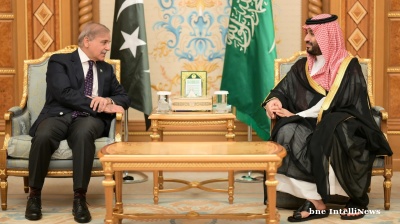The government of Afghanistan announced on August 17 that it has finalised trade and investment deals worth $2.5bn with neighbouring Uzbekistan.
The agreements were signed during a visit to Kabul by Uzbek Prime Minister Abdulla Aripov, the highest-level foreign official to visit Afghanistan since the Taliban regained control three years ago.
Accompanied by a high-level delegation, Aripov’s visit highlights the deepening ties between the two nations amidst Afghanistan's ongoing economic struggles. The two-day visit saw the signing of 35 memorandums of understanding (MoUs) across various sectors, as the Taliban seeks to attract foreign investment and bolster economic stability.
The signing ceremony, which took place after the opening of an exhibition of Uzbek products in Kabul, was presided over by Aripov and Afghan Deputy Prime Minister Abdul Ghani Baradar. The agreements cover a range of sectors, including agriculture, energy, infrastructure and manufacturing.
“The MoUs include 12 investment agreements valued at $1.4bn and 23 trade agreements worth $1.1bn,” Baradar's office announced in a statement published on X (formerly Twitter).
“The implementation of these agreements is expected to strengthen economic ties between the two countries and significantly boost trade,” the statement added.
An Uzbek government statement added that “there are all opportunities to increase the mutual trade turnover to $1bn this year, and to $3bn in the near future, and for this, it is necessary to consistently implement the unused resources on a mutually beneficial basis.”
According to Tashkent, the preferential trade agreement between the two countries will enter force on October 1, lifting import duties on 14 products, and facilitating trade.
Several separate agreements covered the extended opening of the Ayritom-Khayraton border post, the easing of procedures for issuing phytosanitary permits, and an agreement on mutual promotion and protection of investments.
Strengthening bilateral relations
Uzbekistan has a strategic interest in Afghanistan as a key partner in Central Asia. The two countries share a 144-kilometre border, and both sides have worked to strengthen bilateral relations have seen a steady improvement since the Taliban's takeover in August 2021.
The fundamentalist group swept back into power as US and Nato forces withdrew from the country, ending a 20-year conflict. However, no country has formally recognised their government, and Afghanistan remains largely isolated on the international stage.
The agreements are seen as a significant step towards integrating Afghanistan into regional economic frameworks. Until now, the lack of formal recognition, combined with global sanctions targeting top Taliban leaders, has severely constrained Afghanistan’s access to international development assistance, further exacerbating the country’s economic woes.
The UN Development Programme (UNDP) reported earlier this year that Afghanistan’s GDP slumped by 27% between 2020 and 2023, following the Taliban's takeover, and despite stabilising has failed to regain lost ground. The exclusion of women from many segments of the workforce — as well as more broadly from public life — has had a further negative impact on the economy.
Despite these challenges, the Taliban has sought to improve ties with neighbouring countries like Uzbekistan, which has become a key trading partner. According to recent data, trade between the two nations reached approximately $461.4mn in the first half of 2024, a 24.5% increase compared to the same period in 2023.
Uzbekistan’s exports to Afghanistan, which include essential goods such as food and energy supplies, have been steadily rising.
Regional and international implications
The growing cooperation between Afghanistan and Uzbekistan could have significant implications for regional stability and economic development. Uzbekistan’s President Shavkat Mirziyoyev has been vocal about the need for regional cooperation with Afghanistan, urging the international community to engage with the Taliban government in dialogue.
In a speech at the United Nations Special Programme for the Economies of Central Asia (SPECA) in late 2023, Mirziyoyev highlighted Afghanistan’s importance to regional stability. “We cannot afford to leave this country alone with its problems. A positive outcome cannot be achieved without engaging the current government in international dialogue,” he said, calling for a concerted effort to support Afghanistan through economic and diplomatic means.
Uzbekistan has also been involved in several key infrastructure projects in Afghanistan, including the reconstruction of a 75-kilometre cross-border railway line, which aims to enhance connectivity and facilitate trade between the two countries. Additionally, there are ongoing discussions about extending this route to Pakistan, further integrating Afghanistan into the regional transport network.
Challenges and Criticism
However, the Taliban’s domestic policies, particularly those concerning women’s rights and education, have drawn widespread international criticism. The group has barred girls from attending school beyond the sixth grade and restricted women’s participation in public and private sector employment, actions that have been condemned by human rights organisations and foreign governments alike.
The Taliban has rejected these criticisms as interference in Afghanistan’s internal affairs, asserting that their policies align with local cultural and religious norms. This stance has complicated efforts to secure broader international recognition and support, leaving the Taliban largely dependent on regional allies like Uzbekistan, amid its broader international isolation.
News

Taiwan central bank maintains rates as growth momentum strengthens
Officials at the Central Bank of the Republic of China cited robust economic performance and subdued price pressures as reasons to hold steady.

Trump mistakes Armenia for Albania for the third time at UK press conference
US president says he brought peace to “Aberbaijan” and Albania as he touts his peacemaker credentials during UK state visit.

Iran conducts evening ballistic missile test at Semnan facility
Iran conducts evening ballistic missile test at Semnan range with Sejjil-class system, residents report dramatic launch amid heightened security around military facility.

Pakistan gives Saudi Arabia a landmark Article 5 collective security guarantee
In what is likely to be a game-changing decision, Pakistan, a nuclear power, has given Saudi Arabia an Article 5-like collective security guarantee.
_1758207765.jpg)



